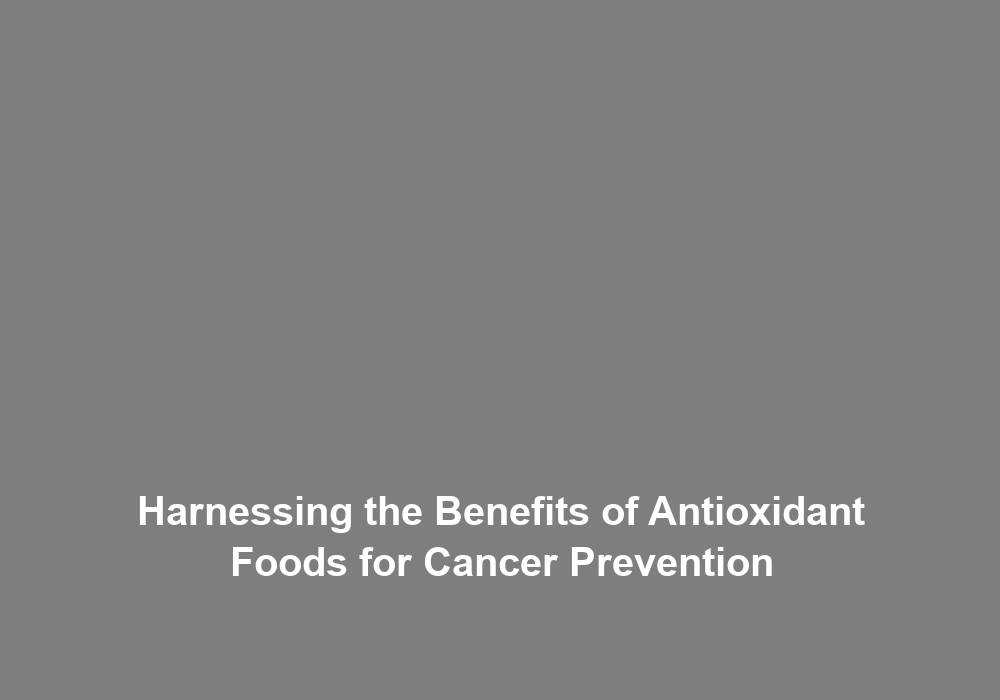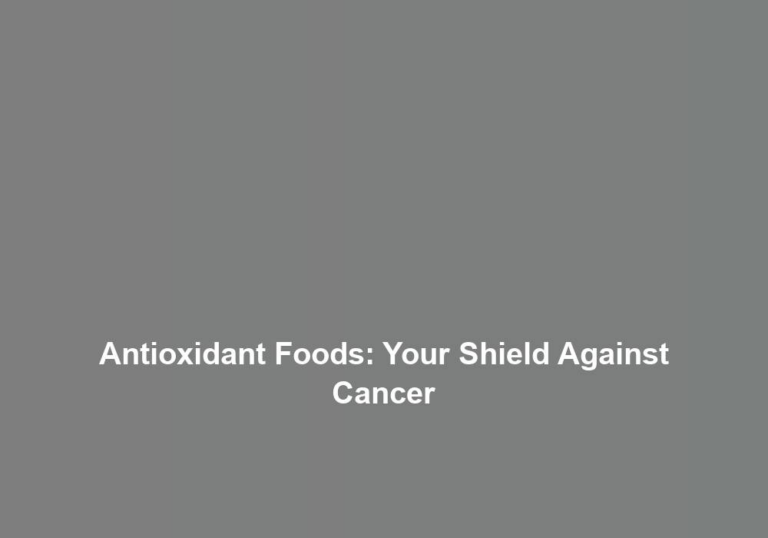Harnessing the Benefits of Antioxidant Foods for Cancer Prevention
You may think of antioxidants as mere health boosters, but their potential in cancer prevention is far more significant than you might realize. As you navigate the complex world of nutrition and disease prevention, understanding the role antioxidants play in combating cancer is crucial. With the ever-growing body of scientific research shedding light on the powerful effects of antioxidant-rich foods, youG??re on the brink of uncovering a wealth of information that could potentially change the way you approach your diet and overall health.
Understanding Antioxidants and Free Radicals
Understanding antioxidants and free radicals is crucial for comprehending the role of these compounds in the bodyG??s defense against cellular damage and disease. Antioxidants are molecules that help prevent the oxidation of other molecules. Oxidation reactions can produce free radicals, which are highly reactive molecules that can cause damage to cells and tissues in the body. This damage is known as oxidative stress and has been linked to various diseases, including cancer.
Free radicals are generated naturally in the body as byproducts of normal metabolic processes. Additionally, they can be introduced from external sources such as tobacco smoke, air pollutants, and ultraviolet radiation. When free radicals accumulate, they can start damaging important cellular components like DNA, proteins, and cell membranes. This damage can lead to mutations and disruptions in cell function, potentially contributing to the development of cancer and other chronic diseases.
Antioxidants play a crucial role in neutralizing free radicals, thus protecting the body from oxidative stress. They accomplish this by donating electrons to stabilize the free radicals, thereby preventing them from causing further damage. The body produces some antioxidants naturally, but it also relies on obtaining others from the diet, primarily through consumption of fruits, vegetables, and other plant-based foods.
Key Antioxidant Foods for Cancer Prevention
To effectively incorporate key antioxidant foods into your diet for cancer prevention, consider including a variety of colorful fruits and vegetables rich in vitamins, minerals, and phytochemicals. These foods are not only delicious but also provide a wide range of health benefits, including their potential to reduce the risk of cancer. Here are some top antioxidant foods that you can easily include in your daily meals:
-
Berries: Berries such as blueberries, strawberries, and raspberries are packed with antioxidants like vitamin C, flavonoids, and polyphenols. These powerful compounds have been shown to combat oxidative stress and inflammation, which are linked to cancer development.
-
Cruciferous Vegetables: Vegetables like broccoli, cauliflower, and Brussels sprouts are rich in antioxidants such as sulforaphane and indole-3-carbinol. These compounds have been studied for their potential to inhibit the growth of cancer cells and reduce the risk of certain types of cancer.
-
Leafy Greens: Spinach, kale, and Swiss chard are excellent sources of antioxidants like vitamin E, beta-carotene, and lutein. These antioxidants have been associated with lower cancer risk and may help protect cells from damage.
Incorporating these antioxidant-rich foods into your diet can provide you with a wide array of benefits, including reducing inflammation, protecting cells from damage, and potentially lowering the risk of developing cancer. By making these foods a regular part of your meals, you can take proactive steps towards cancer prevention while enjoying a delicious and nutritious diet.
The Science Behind Antioxidants and Cancer
Antioxidants are compounds that can help protect your cells from damage caused by free radicals, which are unstable molecules that can lead to oxidative stress and potentially contribute to the development of cancer. The mechanisms by which antioxidants work to prevent cancer involve neutralizing free radicals and reducing oxidative stress. Clinical evidence suggests that the consumption of antioxidant-rich foods may play a role in reducing the risk of cancer.
Antioxidant mechanisms involve various pathways, including scavenging free radicals, inhibiting oxidative damage to DNA, proteins, and lipids, and modulating cell signaling pathways that are involved in cell growth and survival. By neutralizing free radicals, antioxidants help prevent the cellular damage that can lead to cancer development. Additionally, antioxidants can stimulate the bodyG??s own defense mechanisms, further enhancing the protection against cancer.
Clinical evidence supports the role of antioxidants in cancer prevention. Studies have shown that a diet rich in antioxidants, such as vitamins C and E, beta-carotene, and other phytochemicals, is associated with a reduced risk of certain types of cancer. For example, consuming fruits and vegetables, which are abundant sources of antioxidants, has been linked to a lower risk of developing cancers of the lung, breast, prostate, and digestive tract.
Understanding the science behind antioxidants and cancer can empower you to make informed choices about your diet and lifestyle to reduce your risk of cancer. By incorporating antioxidant-rich foods into your daily meals, you can harness the potential benefits of these compounds in cancer prevention.
Incorporating Antioxidant Foods Into Your Diet
Incorporate antioxidant-rich foods into your daily meals to harness the potential benefits of these compounds in reducing your risk of cancer, based on clinical evidence supporting their role in cancer prevention. Antioxidants are plentiful in a variety of foods and can easily be integrated into your diet. Here are some practical ways to ensure you are incorporating these cancer-fighting compounds into your meals:
-
Antioxidant-rich recipes: Look for recipes that incorporate foods known for their high antioxidant content, such as berries, dark leafy greens, nuts, and seeds. Experiment with smoothie bowls, salads, and stir-fries to add a burst of antioxidants to your meals.
-
Colorful fruits and vegetables: Make it a point to include a variety of colorful fruits and vegetables in your meals. Different colors indicate different antioxidant compounds, so aim for a rainbow on your plate. For example, blueberries, strawberries, spinach, and bell peppers are all rich in antioxidants and can be easily incorporated into your daily meals.
-
Limit processed foods: Processed foods often contain fewer antioxidants and may even have added preservatives that can be harmful. By focusing on whole, unprocessed foods, youG??ll naturally increase your antioxidant intake while also supporting overall health.
While incorporating antioxidant-rich foods into your diet is crucial, itG??s important to note that relying solely on food for antioxidants may not be sufficient. In some cases, antioxidant supplements may be recommended, but itG??s essential to consult with a healthcare professional before adding supplements to your routine.
Practical Tips for Maximizing Antioxidant Benefits
Maximizing the benefits of antioxidants involves consciously diversifying your daily intake of colorful fruits, vegetables, nuts, and seeds to ensure a wide spectrum of antioxidant compounds in your diet. While whole foods should be your primary source of antioxidants, there are practical tips to help you maximize their benefits. When considering antioxidant supplements, itG??s essential to remember that they should not be used as a substitute for a balanced diet rich in fruits and vegetables. However, in some cases, such as when dietary restrictions or specific health conditions limit food choices, supplements can be beneficial. ItG??s important to consult with a healthcare professional before incorporating any antioxidant supplements into your routine to ensure they are safe and appropriate for you.
Additionally, incorporating antioxidant-rich recipes into your meal planning can be an enjoyable way to boost your antioxidant intake. Experiment with dishes that feature a variety of colorful fruits and vegetables, such as vibrant salads, smoothie bowls, and antioxidant-packed stir-fries. By exploring new recipes, you can expand your antioxidant sources and create flavorful, nutrient-dense meals.
Remember that the key to maximizing antioxidant benefits lies in the diversity of your food choices. By incorporating a wide array of antioxidant-rich foods into your daily meals and snacks, you can harness the full potential of these powerful compounds to support your overall health and well-being.
Conclusion
Incorporating antioxidant-rich foods into your diet can help protect your body from the harmful effects of free radicals, potentially reducing your risk of cancer. With a variety of delicious options like berries, leafy greens, and nuts, itG??s easy to add these cancer-fighting powerhouses to your meals. So, donG??t let the opportunity to G??kill two birds with one stoneG?? slip away – start reaping the benefits of antioxidants today!







